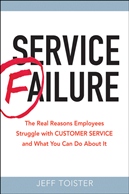The rules of social media: engaging customers in public forums
 Jeff Toister
Jeff Toister  Monday, November 2, 2009 at 1:20PM |
Monday, November 2, 2009 at 1:20PM |  Today's post is a quick weigh-in a topic that has drawn a variety of opinions: should you engage customers directly in social media forums? Some people suggest this is a good way to get out in front of issues, and there are numerous success stories where a company has engaged people through Twitter, Get Satisfaction, Yelp, and other forums. Other people have decried this practice as an intrusion, as though the company being discussed should simply sit out the conversation and let the masses decide for themselves.
Today's post is a quick weigh-in a topic that has drawn a variety of opinions: should you engage customers directly in social media forums? Some people suggest this is a good way to get out in front of issues, and there are numerous success stories where a company has engaged people through Twitter, Get Satisfaction, Yelp, and other forums. Other people have decried this practice as an intrusion, as though the company being discussed should simply sit out the conversation and let the masses decide for themselves.
Here's my opinion: it all depends.
Ultimately, its your customers (not you) that decide whether you picked the right approach. This leaves you with three basic choices:
- Do whatever you can to understand your customers so you can appropriately respond to their needs. Online, the means knowing whether or not your customers want you to engage them through public forums.
- Educate your customers to convince them you are working in their best interests. This approach can be highly effective, but it can also backfire if your educational efforts miss the mark.
- Segment your customer base by those that like to be served the way you like to serve and those that don't. Spend your time, money, and marketing efforts pursuing the customers who like what you have to offer. Spend as little time, money, and effort dealing with customers who want what you don't have. This approach works great if there are a lot of customers who like you just the way you are. It doesn't work so well if it whittles down your potential customer base to your Mother and your dog, the two "people" who love you unconditionally.
A quick example...
Recently, I posted a recommendation on Yelp for one of my favorite Italian restaurants, Antica Trattoria. I was pleasantly surprised to get a message from the owner thanking me for the review. His outreach made me even more loyal and I can't wait to go back. Here's what he wrote:
"Hi Jeff T.,
I wanted to personally thank you for sharing your positive experience at Antica Trattoria on Yelp. Our staff works hard to ensure that you enjoy your time here, so it's most rewarding to hear that our restaurant helped to make your dining experience a positive one.
Please feel free to ask for me and when you are next coming in- it would be my pleasure to meet and thank you again in person. In the meantime, please let me know if you have any suggestions for us, as we are continuously trying to improve.
Best wishes,
Francesco Basile
Chef/Owner Antica Trattoria"
Where do you come out?





